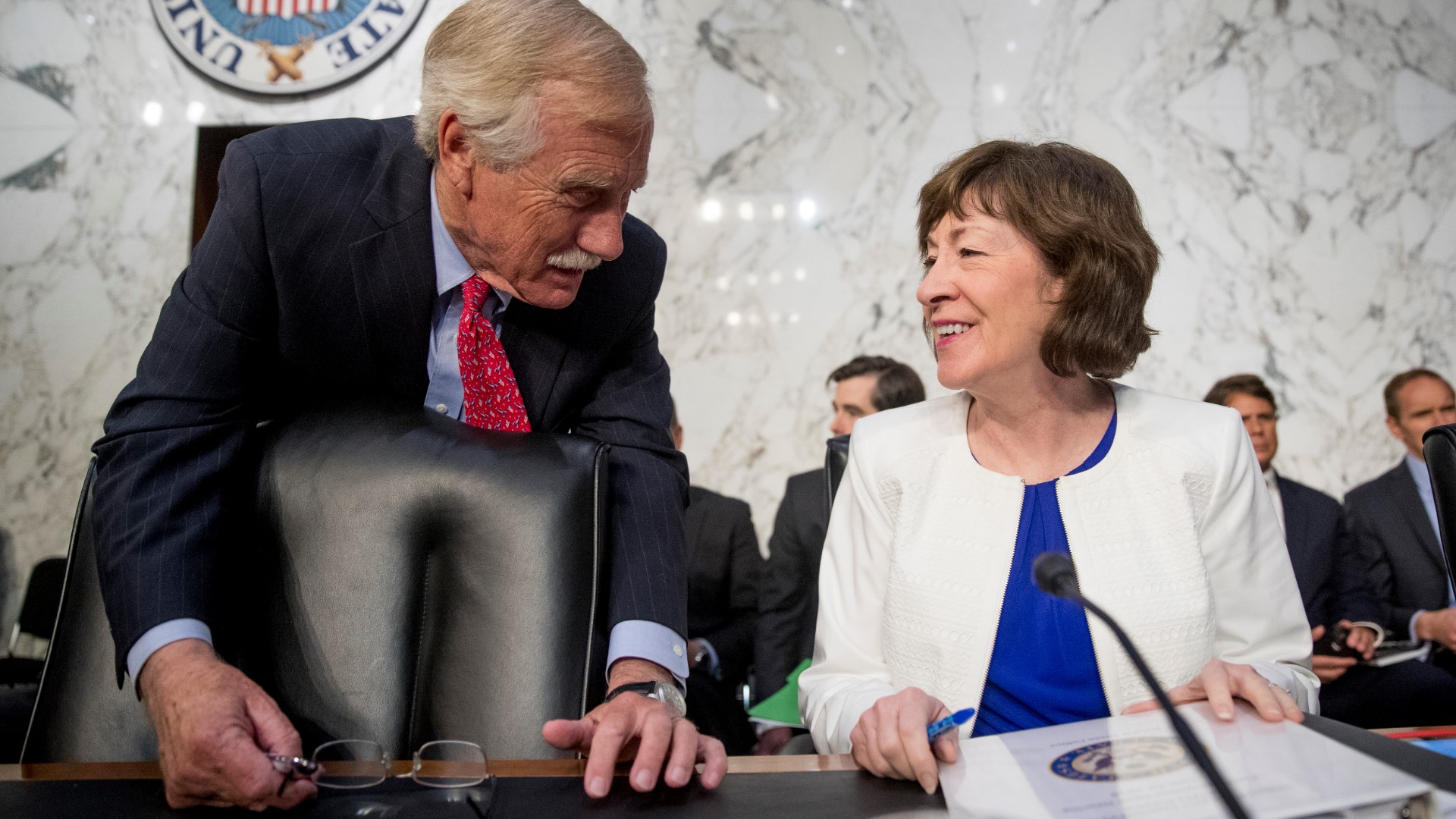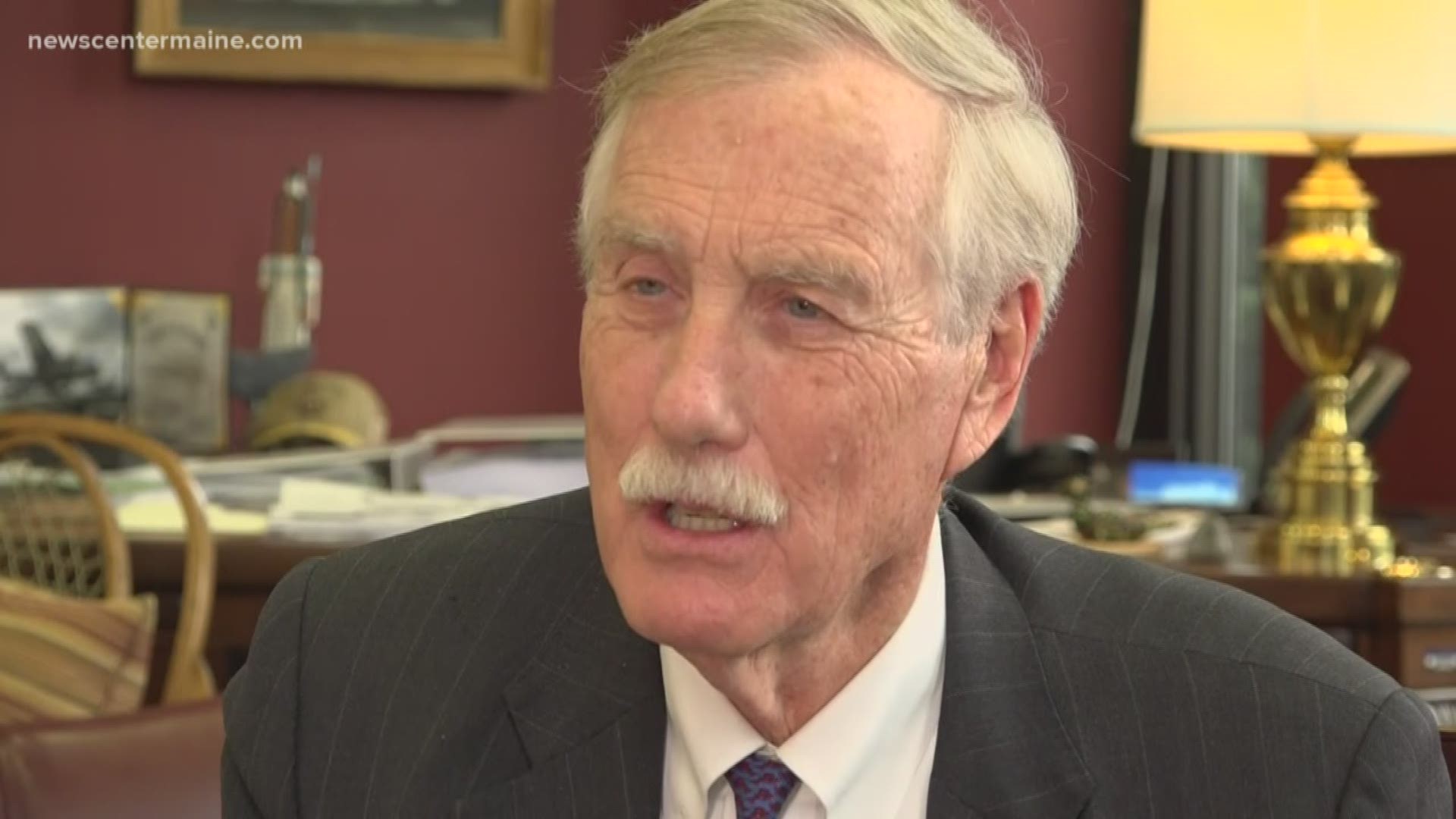WASHINGTON, D.C., USA — Maine Independent Sen. Angus King confirmed he will in fact vote to convict President Donald Trump. King made the announcement in a speech on the Senate floor Tuesday, shortly after Sen. Susan Collins shared her decision that she would vote to acquit the president.
"I do not arrive at this conclusion lightly," King said in his speech Tuesday.
The Maine senators have starkly different opinions on the final vote, though they both voted last week to allow additional witness testimony.
"This was not a trial in any real sense," King said in his speech Tuesday. "It was instead an argument based upon a partial, but still damning, record. How much better it could have been had we had access to all the facts, facts which will eventually come out, but too late to inform our decisions."
King has been outspoken over the last nearly three weeks of proceedings about the allegations surrounding Pres. Trump. He called them "serious" and "inappropriate."
Trump was charged with abuse of power and obstruction of Congress for allegedly withholding millions of dollars in federal aid to Ukraine in exchange for its leaders to investigate his political rival former Vice President Joe Biden.
"I have always been a conservative on impeachment," King said in his speech. "Impeachment is not a punishment, it's a prevention."
King emphasized that Trump was "not remorseful" for his actions, but acknowledged that his decision would anger some of his supporters.
"If the president is removed there will be a reaction in the country, his followers will feel that it was unfair, it was a hoax, it was a witch hunt," Sen. King told NEWS CENTER Maine in an interview at his Washington office just before his speech. "I can’t ignore that, but I also can’t ignore what he did."
He first told NEWS CENTER Maine last week he would "likely vote guilty" adding "that's how the facts appear to me."
King was particularly focused on the claims made by former National Security Advisor John Bolton's new book. A manuscript of that book was released in a report by The New York Times.
King was a large advocate for calling witnesses, like Bolton, to testify, but Republicans successfully blocked a motion to allow witnesses and new evidence in the trial.
"It's neither been fair nor a trial," King said. "How can you have a trial without witnesses?"
The vote to allow witnesses failed on Friday.
King said the failure to call witnesses, "stains this institution, undermines tomorrow’s verdict, and creates a precedent that will haunt those who come after us and the country as well."
In an interview, King emphasized the long-term impact he believed acquitting the president would have on the power of future presidents. He compared it to playing a game of hide-and-seek and yelling 'Olly olly oxen free.'
"It's free game," King said.
Senators are expected to vote at 4 o'clock Wednesday afternoon.
Sen. King's full speech:
Mr. President, I’d like to share my remarks not only with my colleagues today, but moreso with those who come after us, and I want to touch on four issues – the trial itself, the President’s actions as outlined in impeachment Articles 1 and 2, and finally, the implications of our decision this week on the future of our government and our country.
First, the trial. Weeks ago, I joined my colleagues in swearing an oath to ‘do impartial justice’ – and since that time, I’ve done everything possible to fulfill that responsibility: paid full attention, taken three legal pads’ worth of notes, reviewed press accounts, and had conversations with my colleagues, and citizens in my home state of Maine. The one question I got most frequently back home was how we could proceed without calling relevant witnesses and securing the documents that would confirm – or deny – the charges against the President which are at the heart of this matter. But for the first time in American history, we failed to do so, robbing ourselves, and the American people, of a full record of this president’s misuse of his office. This failure stains this institution, undermines tomorrow’s verdict, and creates a precedent that will haunt those who come after us and the country as well.
But, now we’re here -- left to make this decision without the facts concealed by the White House and left concealed by the votes of this body last Friday. This was not a trial in any real sense; it was instead an argument based upon a partial, but still damning, record. How much better it could have been had we had access to all the facts, facts which will eventually come out, but too late to inform our decisions.
As to the Articles themselves, I should begin by saying that I have always been a conservative on impeachment – for the better part of the last 3 years, I have argued, both publicly and privately, against the idea. Impeachment should not be a tool to remove a president on the basis of policy disagreements; the President’s lawyers are right when they argue that this would change our system of government and dangerously weaken any president.
But the events of last summer were no policy disagreement; they were a deliberate series of acts whereby the President sought to use the power of his office in his own personal and political interest, specifically by pressuring the government of a strategic partner – a partner, by the way, significantly dependent on our moral and financial support – to take action against one of the President’s political rivals and thereby undermine the integrity of the coming American election.
And this last point is important. In normal circumstances, the argument of the President’s defenders that impeachment is not necessary because the election is less than a year away would be persuasive. But the President was attempting to undermine that very election – and he gives every indication he will continue to do so. He has expressed no understanding that he did anything wrong, let alone anything resembling remorse. Impeachment is not a punishment, it is prevention, and the only way, unfortunately, to keep an unrepentant president from repeating his wrongful actions is removal. He has made it plain that he will listen to nothing else.
Article One charges a clear abuse of power in inviting foreign interference with the upcoming election. The President tasked his personal attorney to work with a foreign head of state, to induce an investigation – or just the mere announcement of one – that could harm one of the President’s top political rivals. And to compel the Ukrainians to do so, he unilaterally withheld nearly 400 million dollars appropriated by Congress to help them fend off Russia’s naked and relentless aggression. The President’s backers claim that this was done in an effort to root out corruption – but why not use official channels? Why did he focus on no examples of corruption other than ones directly affecting his political fortunes? And why did he not make public the withholding of funds, as the executive branch typically does when seeking to leverage federal monies for policy goals?
No matter how many times the President claims it was a perfect call, it simply wasn’t. He clearly solicited foreign interference in our elections; he disregarded a Congressionally-passed law; he imperiled the security of a key American ally; he undermined our own national security. And if he was simply pursuing our national interest rather than his own, why was his personal attorney Rudy Giuliani in charge? Put bluntly: no matter the defense, and as a majority of the members of this body apparently now recognize, President Trump still placed his own political interests above the national interests he has sworn to protect. And as I mentioned, he has shown no sign that he will stop doing so when the next occasion arises, as it surely will.
The implications of acquitting the President on Article One are serious: this President will likely do it again, and future presidents will be unbound from any restraints on the use of the world’s most powerful political office for personal political gain. We are moving dangerously close to an elected monarch – the very thing the Framers feared most.
Article 2, to me, is even more serious in its long-term implications. Article 1 concerns an incident – an egregious misuse of power, to be sure, but a specific set of actions – a scheme is the most appropriate description – which took place over the course of the last year. Article 2, however, which concerns the president’s wholesale obstruction of the impeachment process, goes to the heart of Congress’s Constitutionally-derived power to investigate wrongdoing by this or any future president.
I do not arrive at this conclusion lightly. I take seriously the White House counsel’s argument that there is a legitimate separation of powers issue here, that executive privilege is real (although never actually asserted in this case), and that there must be limits on Congress’s ability to intrude upon the executive function. But in this case, despite counsel’s questions about which authorizing resolution passed when or whether the House should have more vigorously pursued judicial remedies, the record is clear and is summarized in the White House letter to the House in early October – that the President and his Administration “cannot participate” in the impeachment process. To me, it is this ongoing blanket refusal to cooperate in any way – no witnesses, no documents, no evidence of any kind – that undermines the assertion that a categorical refusal – with overt witness intimidation thrown in – was based upon any legitimate, narrowly tailored, legal or Constitutional privilege.
No prior president has ever taken such a position – and the argument that this blanket obstruction should be tested in court is severely undercut by the Administration’s recent argument that the courts have no jurisdiction over such disputes – and that the remedy for a stonewalled Congress, is – you guessed it – impeachment.


